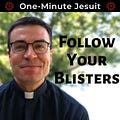I don't know when I first encountered the phrase "follow your bliss," but it sounded like something one might see on a charm bracelet sold on Etsy. It seemed incomplete — and a bit woo woo.
If I simply followed my bliss, I would eat even more gelato than I already do. I would also refrain from uncomfortable challenges that are ultimately meaningful.
Paying attention to where we are experiencing deep joy is an important part of the discernment process, but it's not the whole equation.
It turns out that Joseph Campbell, the professor of myth who popularized the "follow your bliss" mantra, objected to how this phrase was often interpreted. He did not intend to encourage a hedonistic existence. He apparently grumbled, “I should have said, ‘Follow your blisters.’”
Paying attention to "blisters," the struggles and sacrifices we are willing to tolerate — and maybe even enjoy — is a helpful part of the discernment process.
I had a blast studying for the statistics classes I took in high school and college. My (sane) classmates did not have the same experience. The fact that I could sit long enough to develop statistical "blisters" was a major reason I became an economics major.
So, sure, follow your bliss. But make sure you also follow your blisters.
Three additional notes:
To my fellow Americans, happy 4th!
I will be on the road and often without a computer for the next few weeks. My posts will be a little less consistent this month. Thanks for understanding.
Thanks to all of you who have purchased my new book. If you resonate with what I do here, I think you’ll enjoy it. Again, thanks.


